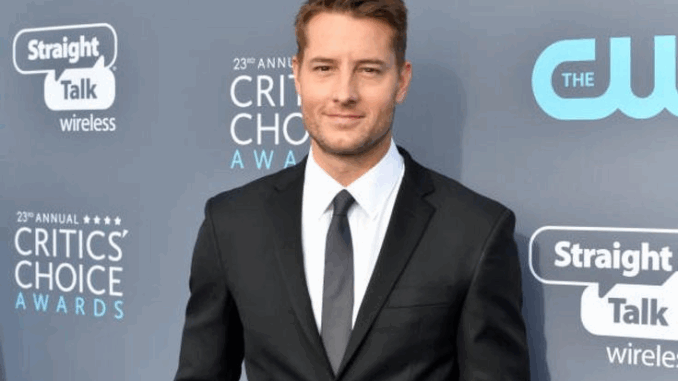
From Silent Strength to Vulnerable Truth, Hartley Leads a Quiet Revolution on Screen
For decades, the standard image of a male television hero was rigid: stoic, action-oriented, emotionally unavailable, and defined by dominance. But over the last several years, a subtle yet powerful shift has begun to take root—one shaped by performances that favor emotional honesty over bravado, introspection over invincibility. Among the actors helping to redefine what it means to be a man on screen, Justin Hartley stands out as a quiet revolutionary.
From This Is Us to Tracker, Hartley’s characters are layered, complex, and often emotionally wounded. They cry. They love. They make mistakes. And most importantly—they grow. Through his portrayals, Hartley is not just playing characters—he’s challenging an entire cultural script about what masculinity is supposed to look like.
Kevin Pearson: Flawed, Broken, Human
Hartley’s breakout role as Kevin Pearson in This Is Us is perhaps the most vivid example of how he reshaped audience expectations. At first glance, Kevin is a walking archetype: a handsome actor, rich and popular, coasting on charm. But as the show peels back layers, Kevin becomes one of the most emotionally intricate male characters in recent television.
He struggles with abandonment, addiction, identity, and grief. He seeks approval from his father, wrestles with insecurity, and experiences crushing loneliness. These are not traditionally “masculine” traits in network drama—but they’re real.
And Hartley plays them with sincerity, not shame. His Kevin is not a man failing at being strong—he is a man learning that true strength is emotional vulnerability. In season after season, Hartley led one of the most honest portrayals of a man navigating trauma that TV has ever seen.
Colter Shaw: Lone Wolf with a Moral Code
In Tracker, Hartley takes a turn toward the action genre—but even here, he avoids the emotionally closed-off cliché of a man with a gun and a vendetta. Colter Shaw is a survivalist and tracker, but he’s also deeply ethical, empathetic, and curious. He listens. He respects boundaries. And when he uses force, it’s not to dominate, but to protect.
What makes Colter refreshing is that his strength isn’t linked to emotional detachment. Unlike classic loners of television lore, he doesn’t scoff at connection—he simply fears the cost of it. That tension between independence and longing gives the character depth.
Hartley plays him not as a superhuman, but as a man shaped by wounds, still learning how to trust, and trying to help others avoid the mistakes he made. It’s a quiet subversion of the action-hero mold.
A Shift in Gendered Storytelling

In traditional media, female characters were often tasked with emotional labor—crying, expressing, nurturing—while men served as vessels of action and control. Hartley’s characters flip that paradigm, and in doing so, reflect a growing shift in audience expectations.
In This Is Us, Kevin’s emotional breakdowns are central to the plot. He’s not a side character propping up someone else’s arc. His emotional world is the story. Hartley’s portrayal showed that male vulnerability wasn’t just acceptable—it could be compelling, poetic, and even heroic.
By allowing men to express love, regret, fear, and yearning without shame, Hartley has helped open the door for richer, more balanced portrayals of masculinity on screen.
The Actor’s Own Vulnerability
Part of what makes Hartley’s performances resonate is that he draws from personal truth. He’s spoken publicly about the emotional toll of divorce, single fatherhood, and professional rejection. He’s discussed therapy, anxiety, and the difficulty of setting boundaries in a culture of overexposure.
This openness isn’t performative—it’s lived-in, and it shows in his work. He doesn’t “act” vulnerability; he inhabits it.
Colleagues have praised Hartley for his emotional availability on set. “You never feel like he’s pretending to feel something,” said This Is Us co-star Chrissy Metz. “He feels it. And so do you.”
Audience Reaction: Resonance Across Genders
Perhaps one of the most telling indicators of Hartley’s impact is how audiences—especially male viewers—respond to his roles. On forums, in interviews, and in personal testimonials, men speak about seeing themselves in Kevin Pearson or Colter Shaw. About crying during episodes. About feeling seen.
This matters.
In a culture that often tells men to be strong by being silent, Hartley’s characters give permission to speak, feel, and heal. And in doing so, he is part of a broader movement reshaping how men are allowed to exist in pop culture.
Women, too, find his portrayals refreshing. Not because his characters are flawless, but because they’re accountable. They try. They learn. They listen.
Future Roles and Creative Control
As Hartley takes on more producing roles, his influence on male character development will likely deepen. He’s already championing stories—like Capital Veins and Truth Be Buried—that place emotionally complicated men at the center of high-stakes, meaningful narratives.
These aren’t superheroes. They’re real people. Broken, healing, and trying.
And that’s the kind of masculinity that resonates in a world desperate for authenticity.
Conclusion: The Quiet Redefinition of the Modern Man
Justin Hartley may not be the loudest voice in Hollywood—but his work is part of one of its most meaningful transformations. Through the characters he chooses, the stories he tells, and the truths he dares to show, he is helping to build a new definition of masculinity—one based not on power, but on emotional courage.
In doing so, Hartley is more than a talented actor. He’s a cultural force.
And perhaps that’s his most important role yet.
